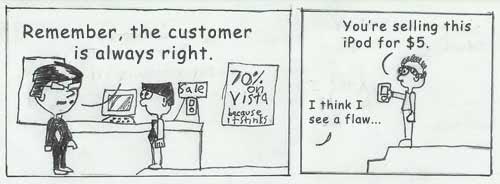Sometimes, complaints management isn't just about handling actual product or service errors or even employee-customer interactions. Sometimes-and unfortunately-complaints management involves dealing with people whose complaints shouldn't even be an issue.
We label these kinds of complaints as unjustified, meaning that they were made without an actual grounds for error.
In this article, we'll be discussing four major principles your complaints handling team should always keep in mind when reacting to unjustified complaints.
1. Is the customer always right?
Here we tackle the age-old notion behind customer service: The customer is always right. But is that really the case?
The answer is both yes and no.

Photo via tinypic.com
Yes in the sense that customer complaints should always be given weight and should always be responded to-regardless of the actual complaint. So both justified and unjustified complaints are valued because you should strive to keep a healthy customer relationship. So really, even if your complainant offers a complaint that arises from product misuse or different expectations, the customer is right because, well, they are your customer.
On the other hand, customers can be wrong (but don't tell them that!) on several different levels. As mentioned above, you probably receive lots of complaints about customers who use a product wrong and mistake that for a product failure. Others still might have different expectations about what a product does-say they wanted a fountain pen that writes in black and red and yours only comes in black. In this case, the customer obviously misread or misunderstood what exactly your product offered, and so technically is wrong.
So to you, your company, and your employees, the answer to this question is both yes and no. But to your customers, really, it's just yes.
2. Keep it friendly
The next thing on our list seems rather obvious, but its importance cannot be emphasized enough.
Complaints come from unhappy customers, so naturally, they must be handled with great care.
The best thing your complaints handling staff can do is respond to each complaint in a personalized, helpful, and friendly manner, remembering to show your customer with respect and importance.
Photovia smackjeeves.com
Don’t be overly verbose or technical; there’s nothing an angry person hates more than being made to feel ignorant. Likewise, don’t seem rushed or busy; every single customer deserves your undivided attention, regardless of their actual complaint.
Long story short, attitude, intonation (for in person complaints and phone calls), professionalism, and even body language will affect how your customer sees you. Better to keep things friendly then to make things worse
3. Don’t apologize where you don’t need to
Imagine Carl decides to go out to dinner at your restaurant. After receiving great service and food, Carl proceeds to make a complaint about your restaurant’s atmosphere, commenting that he “doesn’t like Texan decor.”
First off, you should realize that this is the perfect example of an unjustified complaint. Sure, Carl is entitled to like or dislike any kind of decor, but is that really grounds for a complaint?
In this case, you should stick to the initial step of complaints management: that of thanking your complainant for their input. After that, you can decide if you want to really change up your decor or not.
The point of the matter is that most unjustified complaints do not actually warrant an apology; in fact, apologizing to the customer makes it seem like you should’ve provided a service where you did not.
An admission of fault where there is none is unprofessional, and should be actively avoided when dealing with all kinds of complaints.
4. What should you tell the customer?
So what exactly should you tell Carl?
As mentioned above, the first thing you should do with Carl-and indeed, any complainant-is thank them for their comment. This conveys a sense of professionalism and politeness and shows your customer that you value them.
Though the next steps aren’t necessary for unjustified complaints, you can proceed to follow them should you feel that they positively contribute to your customer relationship.
After initially responding to your customer, you should let them know that you are actively investigating the cause of the problem, and what course of action you mean to take to fix it.
If you’re planning on altering your decor because it is in fact unappealing, let Carl know. No doubt he’ll feel better, that is, if it isn’t Texan of course.


